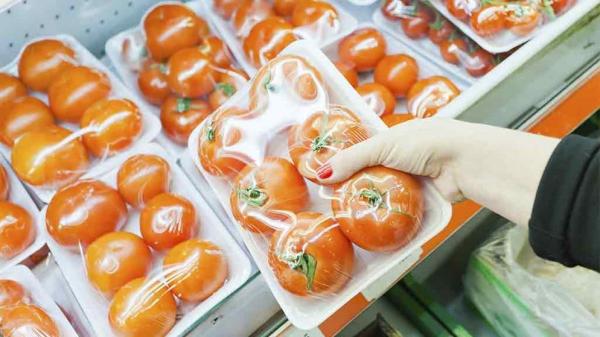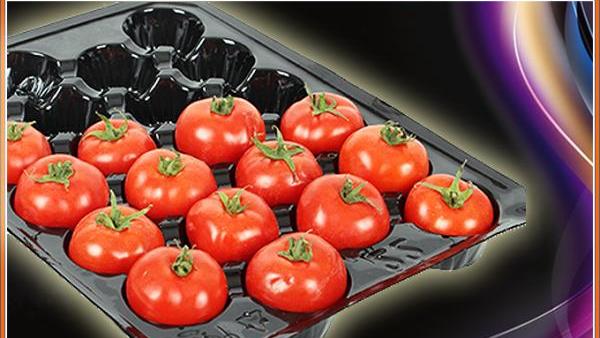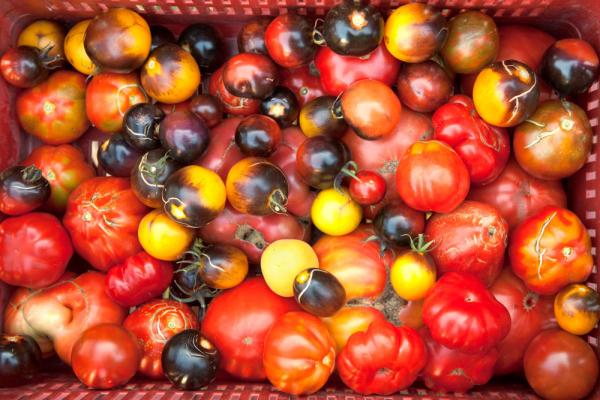Blockchain in farming? It may be incompatible with...
your whole current lifestyle, basically.
Says Wired that “The Fix for E. Coli Outbreaks Could Be … the Blockchain”. At first sight, that title may seem just one more occurrence of the business model of the year, but the problem is a very concrete one: today, tracking and blocking contaminated food can take many weeks, harming too many people and damaging farmers in ways than could and should be avoided. A much better way to guarantee traceability of food is needed, but it is very hard to do it, because:
- “Making our food supply [REALLY] traceable could speed things up”, but it is HARD
- “When there are records, they aren’t necessarily granular enough to be useful”
- A great example of the previous points are those packs of tomatoes “come sealed with shrinkwrap into a plastic tray”:

#Blockchain this, if you can
</em></u>
Why? Because the tomatoes in each plastic tray do not come from the same source, but are “commingled at packing houses and then sorted for similarity of ripeness, size and color”. Therefore, each single tomato in the picture above may come from a different farm. The obvious conclusions are that:

<u><em><strong>CAPTION:</strong>
<a href="https://www.alibaba.com/product-detail/Nursery-bags_157584830.html" target="_blank">Blockchain-tracked tomatoes = please add 26 toxic microchips to this already very polluting tray</a>
</em></u>
- the only way to sell tomatoes in that way, with enough traceability to track contaminated food much better than today is “the equivalent of an RFID chip rubber-banded onto every tomato”
- applying and keeping those chips in place throughout the whole supply chain may be incompatible with anything but large-scale, fully robotized farms
- to make the chips 100% useful, you should also keep notes of how you used every tomato you buy: this for sauce, this for salad… until they’re all gone
- recycling all those chips, you say? Let’s save that for another day :-)
- nothing above would work as desired for any industrially prepared food, from frozen pizzas to sauces
- solve all of the above and, only after that, implementing it with a blockchain is the very, very last of your problems
The key words here are, of course, “in that way”. To make food tracking really easy and fast as we would all like, we should shop for groceries every other day, not once every two or more weeks to save time. But above all, we should stop buying tomatoes (or any other food) mixed and distributed in that way, and only buy them like this:

<u><em><strong>CAPTION:</strong>
<a href="/img/ancient-and-modern-tomatoes.jpg" target="_blank">THESE are trackable tomatoes (click for bigger version, see source below)</a>
</em></u>
Want really, effectively tracked food? Go for farmers selling straight to consumers unsorted, often ugly tomatoes in whole, reusable boxes that they themselves sealed and signed with blockchain. This is infinitely more feasible, effective and environmentally sustainable than making “blockchain-tracked-safe” the tomatoes of the first picture.
No, I do not think that we should or could stop buying any packaged food, and only eat stuff that we personally cooked from raw primary ingredients. I just think that we have to compromise for a sensible middle way between that and certain unreal visions, because:
- the current way to produce, distribute and buy food, is largely a synonym of our own whole lifestyle based on maximum short term convenience
- besides its other costs, that lifestyle may also be fundamentally incompatible with really effective food traceability. Regardless of how much fancy digital technology you throw at it
- the only way to efficiently track food with blockchain may be to produce and distribute food in ways that make much of the need for ANY sophisticated tracking go away
The next time someone starts telling you how digitizing agriculture will save the world, ask them what they think of THESE elephants in that room.
Sources of 1st and 3rd pictures
- Is plastic food packaging dangerous?
- Traditional tomatoes (I have NO relationship with that producer, I inserted that picture because it explains perfectly what I wanted to say)
Who writes this, why, and how to help
I am Marco Fioretti, tech writer and aspiring polymath doing human-digital research and popularization.
I do it because YOUR civil rights and the quality of YOUR life depend every year more on how software is used AROUND you.
To this end, I have already shared more than a million words on this blog, without any paywall or user tracking, and am sharing the next million through a newsletter, also without any paywall.
The more direct support I get, the more I can continue to inform for free parents, teachers, decision makers, and everybody else who should know more stuff like this. You can support me with paid subscriptions to my newsletter, donations via PayPal (mfioretti@nexaima.net) or LiberaPay, or in any of the other ways listed here.THANKS for your support!